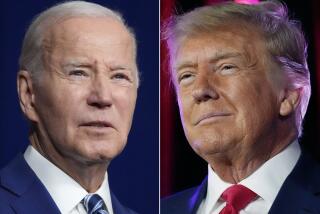Bosnia Elections: a Shaky but Hopeful First Step
- Share via
At this time last year, another chill Bosnian autumn was on the wind and the combatants were at each other’s throats. Now the guns are silent, and on Saturday the country’s Muslims, Serbs and Croats will vote for officials of a jerry-built government. Few have faith in the creation, but it serves a purpose: It was the model that ended the war. It was something to stop on, and may yet become something to build on.
Arguments against holding elections at this point are sound and have ranged from the emotional to the practical. Why, ask human rights advocates, are there elections while indicted war crime suspects remain free? Must justice be buried under politics? How, ask civil rights supporters, can the voting be fair when the media are unbalanced, when citizens are physically barred from their home districts?
The U.S.-engineered peace treaty that brought an official end to the war last December required that elections take place under democratic conditions. That will not happen in Bosnia Saturday. What will take place is sufficient balloting to create a legitimate government, on paper. And that seems to be enough for Washington, its European allies and the Organization for Security and Cooperation in Europe, the agency that set--but has rarely enforced--the rules for the campaign and the elections.
Why the rush? Washington and the other Western powers, in varying degrees, are working on an unannounced timetable here. President Clinton promised to bring American troops home by this December when he committed them nine months ago. It is a promise he hopes to keep.
The other big powers in NATO have taken an “if you go we go” line, which can be read as a political threat against an inexpedient American pullout. Conversely, the Europeans may also be sending a simpler signal: Let’s count on the Bosnians to make this government work--at some point they have to solve their own problems.
Here’s the house that American diplomacy built. In quality, it ranks with a ‘50s ranchette on a shallow slab. Beneath the roof will be two separate entities, one the Muslim-Croat federation and the other a Serb republic. Atop that structure is to be the national presidency--one Muslim, one Serb and one Croat; the candidate with the most votes becomes chairman of the presidency. The former Yugoslavia, of which Bosnia was a part, survived for a while under a rotating presidency, so maybe there is hope, or at least compre- hension.
Officials of these governments will be chosen by an electorate that numbers about 2.9 million on paper, but many tens of thousands of potential voters, caught on the wrong side of the cease-fire lines or otherwise denied promised access to their former homes, will never get to the polling places that list their names.
In a Times report earlier this week from Sarajevo, Kris Janowski, a United Nations official who has worked in Bosnia for several years, put the situation starkly: “There is enormous pressure for a quick fix, and the elections are supposed to be the cornerstone of that. Elections will take place, based on 20 to 30 false assumptions. Everyone know those assumptions are false, but it has become an axiom like the infallibility of the pope. You can’t do anything about it.”
Not now. But Bosnians, if they view what has happened to their country through the lens of good sense, will strive to build stronger institutions and a body of law that will support a multiethnic culture. Separatism cannot survive in a modern society, although Bosnia, alas, may be the exception that proves the rule.
More to Read
Sign up for Essential California
The most important California stories and recommendations in your inbox every morning.
You may occasionally receive promotional content from the Los Angeles Times.













